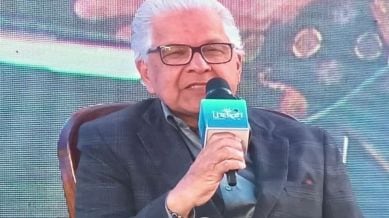Stay updated with the latest - Click here to follow us on Instagram
India, a country “born for freedom, to freedom and anchored in freedom”, is today witnessing an erosion of that very freedom — intellectual, political and cultural — along with a collapse of civility in public discourse and a dangerous imbalance among the three pillars of the Constitution, warned Dr Ashwani Kumar, senior advocate and former Union Law Minister. Speaking on the concluding day of the Chandigarh Literature Festival Literati 2025, the author said the Constitution is indeed under stress not because someone waves the book in rallies, but because the equilibrium between legislature, executive and judiciary has been upset, with courts increasingly intervening in areas traditionally left to the other two organs.
Dr Kumar was in conversation with Manraj Grewal Sharma, Resident Editor, The Indian Express, Chandigarh, discussing his forthcoming book, Guardians of the Republic: Essays on the Constitution, Justice and the Future of Indian Democracy, dedicated to late Prime Minister Manmohan Singh.
Describing democracy as the political system best suited to uphold human dignity, Dr Kumar said he wrote the new book after his Rajya Sabha tenure ended in 2016, when he decided the next chapter of his life must serve a larger purpose. “This book is not just for lawyers; it is for students, young citizens, and every Indian trying to make sense of governance, rights and the state of our democracy today,” he said.
On leadership, which he called central to every phase of India’s story, Dr Kumar praised leaders across the ideological spectrum who shaped the Republic with moral and inclusive vision — Atal Bihari Vajpayee’s unyielding resolve (“Haar nahi manoonga, raar nahi thanoonga”), Manmohan Singh’s economic stewardship, and Rajiv Gandhi’s technological blueprint. Present-day leadership, he said, suffers from a “complete collapse of civility in public discourse”. Dismissing the tag of being “too idealistic”, he insisted: “Idealism is not an insult; it is a necessity. Idealism is simply doing the right thing in the right way.”
Power, he warned, must be tamed by constitutional discipline, moderation and accountability to the people. “A democracy that does not protect the right to dissent cannot call itself a democracy,” he declared.
Addressing the popular political slogan “Samvidhan khatre mein hai”, Dr Kumar said merely holding up the Constitution proves nothing; one must show why it is endangered. “The three organs were meant to function in harmony. Today they are in conflict, competing for space and relevance. That upset equilibrium is the real danger,” he said.
On judicial independence, Dr Kumar argued that courts remain independent in adjudication but “no judge today considers himself or herself above the government — that is the problem”. He cited Chief Justice D.Y. Chandrachud’s observation that the judiciary must not only pronounce but also enforce the Constitution, adding ruefully: “They say the right things but do not enforce them. That has led to a decline in credibility.”
Challenging the prevailing narrative around the collegium system, he asserted that the finest judges were appointed when both judiciary and executive had a role, before the collegium came into existence in 1991. “It is absolutely wrong to say the Law Minister should have no role. The Law Minister represents millions of people,” he said, warning that completely excluding the executive distorts the balance rather than protects independence.
Turning to Chandigarh, Dr Kumar described the proposed Constitution (131st Amendment) Bill, 2025 — which seeks to bring the city under Article 240 like other Union Territories — as essentially political rather than legal. “Punjab’s claim on Chandigarh is clear and remains valid. What is not clear is the Centre’s broader intent and why it is moving in this direction now,” he said.
In his closing remarks, Dr Kumar drew a sharp distinction between majoritarian and constitutional democracy. “Democracy cannot be divorced from popular will or majoritarianism. But power exercised in the name of the people must be tamed by the Constitution,” he said. India, he stressed, must remain a constitutional democracy, not merely a majoritarian one, where anyone elected by the people is still bound by constitutional limits and non-negotiable accountability.
The session ended with Dr Kumar balancing anxiety with hope, urging citizens to reclaim the Republic’s founding ideals of freedom, dignity and constitutional discipline. “Everybody is involved, everybody is equally responsible,” he said, calling for a collective renewal before it is too late.
